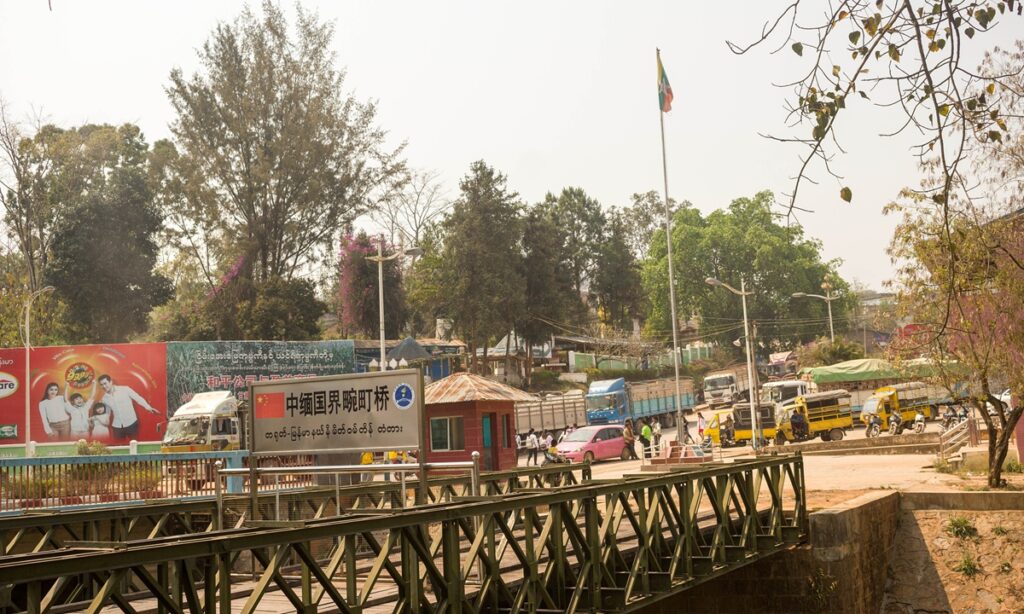The Southern Theater Command of the People’s Liberation Army (PLA) conducted live-fire drills and training exercises along the Chinese side of the China-Myanmar border from November 25 to 28. Against the backdrop of armed conflicts erupting in multiple areas in northern Myanmar and their spillover effects, the drills have attracted attention from various parties, especially some Western media outlets. They have used their own “diplomatic” yardstick to measure China’s every move, attempting to capture certain geopolitical signals they desire, trumpeting “China’s support for local armed forces in Myanmar” and sowing discord between Chinese and Myanmar’s governments. Some have even linked the drills to the recent joint crackdown on telecom fraud by the two countries. Anyone familiar with and having an understanding of China-Myanmar relations knows how absurd, baseless and amateur these conclusions are.
According to the Southern Theater Command’s briefing, the drills are part of the annual training plan and aim to test the rapid maneuverability, border sealing and firepower capabilities of the military units of the theater command. The Southern Theater Command also stated that the theater command forces are always prepared to respond to various emergencies and are resolute in safeguarding national sovereignty, border stability and the safety of the people’s lives and property. This signal is very clear: When facing various external uncertainties in the national border areas, the PLA has the responsibility and capability to maintain peace and stability in these regions, enabling residents in the border areas to feel at ease. On Chinese social media platforms, almost no one associates the PLA’s actions with intervention in Myanmar’s internal affairs. The view that “people feel reassured with the presence of the PLA” overwhelmingly dominates.
In fact, safeguarding border peace and tranquility is one of the PLA’s duties and missions, and similar exercises have been conducted before. For example, in 2017, when the conflict escalated in northern Myanmar and stray bullets even fell on our side, the PLA also conducted joint land and air live-fire exercises on the China-Myanmar border. Similar to the current situation, at that time, some Western public opinion also pointed fingers at China and made unfounded speculations. Over the years, claims like “China covertly intervenes in the situation in Myanmar” have periodically emerged in the West. However, the facts have repeatedly proven these speculations to be highly unreliable. Their only effect is to reflect the uncontrollable impulse of some Westerners to interfere in the internal affairs of other countries.
China does pay close attention to the conflict in northern Myanmar, and has repeatedly urged all parties in Myanmar to immediately cease fire and stop the fighting. From a humanitarian perspective, China has made tremendous efforts to properly settle and assist those affected by the conflict, actively assisting in the evacuation of personnel from third countries through China. This attention reflects the goodwill of “neighbors wish each other well, just as loved ones do to each other.” China sincerely hopes for political and social stability in Myanmar, hopes that the people in the border areas between China and Myanmar can live and work in peace, and hopes to jointly safeguard the security of China-Myanmar cooperation projects and personnel with Myanmar. All of these intentions are open, reasonable, and legitimate. In short, China’s principle of non-interference in the internal affairs of other countries has always been consistent, and its resolute attitude in safeguarding national security and regional stability is also very clear.
Whether it is combating telecom fraud or conducting related exercises, China’s starting point is to maintain regional peace and tranquility and safeguard the legitimate rights and interests of the people. If we must say how these practices “affect Myanmar,” it is that China’s capabilities in shaping peace and stability are growing stronger, and the value concept of “common security” is increasingly ingrained in people’s minds. In the long run, this will inevitably promote neighboring countries of China and even more extensive regional countries to meet China halfway and work together to implement the Global Security Initiative, jointly promoting lasting peace and security in the world. These truths are self-evident, but some people in the West deliberately feign ignorance.
In the situation in Myanmar, China’s contribution in promoting peace talks and reconciliation in recent years is evident to all. The Myanmese side can feel the goodwill of the Chinese side most directly. In fact, Zaw Min Tun, spokesman for the State Administration Council of Myanmar, has already made a clear response, stating that Myanmar was told of the drills and adding that the military’s aim is to “maintain stability and peace” near the border, and not undermine China’s policy of non-interference in Myanmar’s internal affairs. In contrast, Western countries, especially the US, have never ceased their years-long sanctions against Myanmar. Western public opinion often discusses Myanmar’s domestic affairs with excitement and impulsiveness, carrying the notion of “color revolution,” without showing any constructive attitude. We would like to advise them that if they truly care about the feelings of the Myanmar people, they should start by respecting Myanmar.
Global Times




